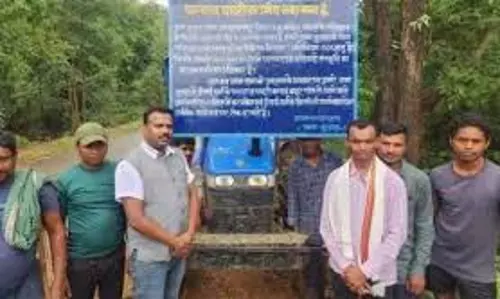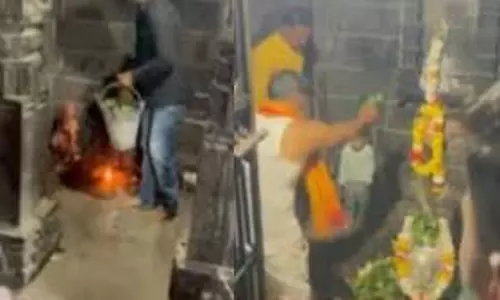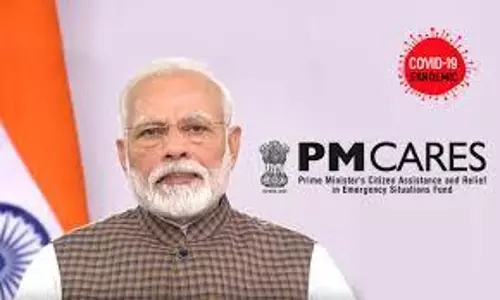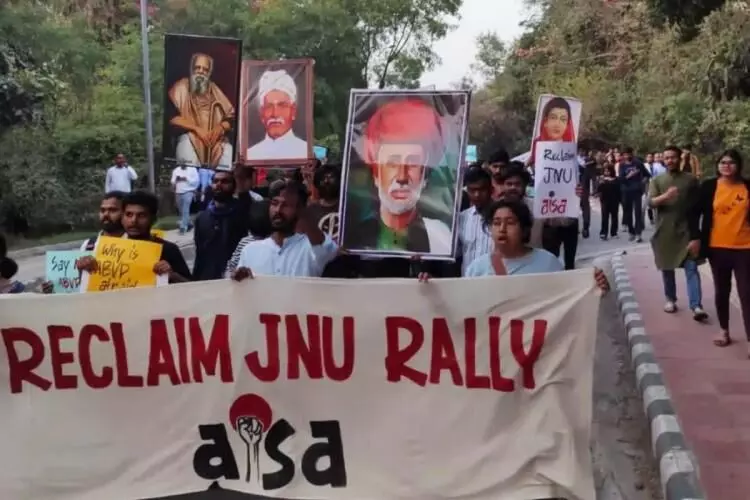
‘Reclaim JNU’- protest against ABVP attack on Tamil students
text_fieldsA protest was held at the Jawaharlal Nehru University (JNU) campus on Saturday, February 25, condemning the assault on Tamil students by the Akhil Bharatiya Vidyarthi Parishad (ABVP) last week.
Organised by the JNU wing of the All India Students’ Association (AISA), the event was held under the banner ‘Reclaim JNU’.
The rally put forth several demands, the first of which was an action against ABVP. The protesting students also demanded the reconstitution of the inquiry committee formed by the university administration to investigate the matter.
‘The professors currently in the committee are close to the ruling dispensation,” Madhurima Kundu, an AISA activist was quoted as saying. ‘We want the committee to have representatives from the JNU-Students Union (JNU-SU) and the JNU Teachers Association,’ she added.
‘The ABVP targets the identities of all those who resist the Union government on campus. In this case, it was Tamils’, Nazar, a PhD scholar was quoted as saying. Nazar had suffered injuries during the attack.
The ABVP, the student wing of the Hindu nationalist organisation Rashtriya Swayamsevak Sangh (RSS), attacked students on February 19 during a screening of the satirical Hindi film Jaane Bhi Do Yaaro.
The outfit took offense to a portrait of Shivaji, which they allegedly had removed.
A memorial meeting was also being held for Darshan Solanki, a Dalit student from IIT Bombay who had died by suicide earlier this month after allegedly facing systemic caste discrimination.
Several students were injured in the attack by ABVP with ambulance taking the injured students to hospitals also blocked on their way.
Students also alleged that the Delhi Police refused to intervene despite witnessing the violence.
The ABVP also allegedly vandalised portraits of Dr BR Ambedkar, Periyar, Bhagat Singh, and Karl Marx.
A circular issued on February 20 by the Dean of Students Sudheer P Singh says that any ‘activity in premises of the Inter-Hall-Administration including all hostels, Students Activity Centre (Teflas) and sports grounds would require formal permission from the Dean of Students.’
The office of the JNU-SU falls within these prescribed areas.
‘The JNU-SU office has now been shut. Access to their office is an inherent right of the students’ union. The elected president of the union has been pushed out of her office and now needs someone else’s permission to access it,’ Nazar said.
According to Madhurima, dining halls were used by students to gather and voice their concerns until a few years back but the practice was stopped by the administration. Students’ union office had been the only remaining such space, she says.
‘Democratic spaces are being eroded on campus. There is a systemic abuse of power and there is a pattern to the violence. Each time the ABVP attacks, a committee such as the present one is formed. It is only increasing the impunity with which the ABVP functions’, Madhurima added.
There have been similar incidents on the campus earlier. In 2020, masked outsiders assaulted students of the university’s Sabarmati Hostel with sticks and rods. Another attack at the Periyar Hostel occurred the same year, and then another in December last year when stones were pelted at students watching the banned BBC documentary India: The Modi Question.
‘This is the latest in multiple such incidents lately. The attacks are becoming more frequent and are occurring with the impunity that no action will be taken against them’, Nazar said.
‘We have heard ABVP say things like, ‘you students from Kerala and Tamil Nadu are minorities here. We are the majority. You should do as we say’, Nazar added.
Ajinkya Sonawane, the president of the Birsa Ambedkar Phule Students’ Association (BAPSA) said that such incidents were meant to distract people from larger issues like Darshan Solanki’s death.
‘We had been taking up the issue before the violence took place. Now his death, which is an institutional murder and not suicide due to ragging as IIT Bombay is claiming, is lost in this conversation of Left versus Right’, he said.
‘Darshan’s death is not an isolated case. It is a result of institutional caste-based discrimination like the deaths of Rohit Vemula and Payal Tadvi, and needs to be viewed as such’, he added.























